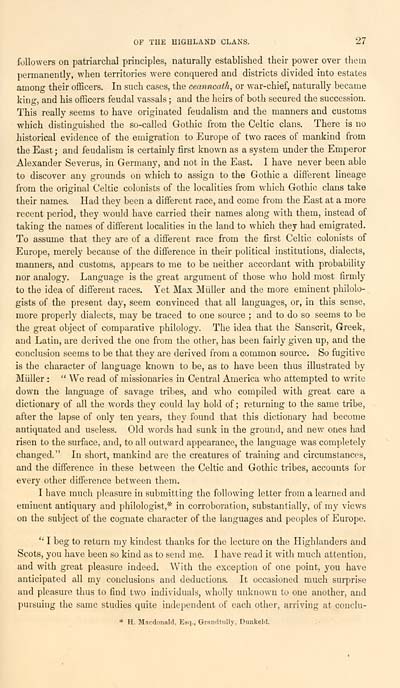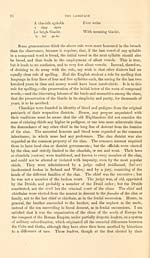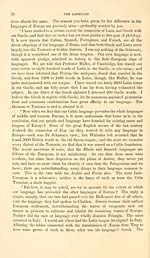Download files
Complete book:
Individual page:
Thumbnail gallery: Grid view | List view

OF THE HIGHLAND CLANS. 27
followers on patriarchal principles, naturally established their power over them
permanently, when territories were conquered and districts divided into estates
among their ofScers. In such cases, the ceanncaih, or war-chief, naturally became
king, and his oflScers feudal vassals ; and the heirs of both secured the succession.
This really seems to have originated feudalism and the manners and customs
which distinguished the so-called Gothic from the Celtic clans. There is no
historical evidence of the emigration to Europe of two races of mankind from
the East ; and feudalism is certainly first known as a system under the Emperor
Alexander Severus, in Germany, and not in the East. I have never been able
to discover any grounds on which to assign to the Gothic a different lineage
from the original Celtic colonists of the localities from which Gothic clans take
their names. Had they been a different race, and come from the East at a more
recent period, they would have carried their names along with them, instead of
taking the names of different localities in the land to which they had emigrated.
To assume that they are of a different race from the first Celtic colonists of
Europe, merely because of the difference in their political institutions, dialects,
manners, and customs, appears to me to be neither accordant with probability
nor analogy. Language is the great argument of those who hold most firmly
to the idea of diflerent races. Yet Max Miiller and the more eminent philolo-
gists of the present day, seem convinced that all languages, or, in this sense,
more properly dialects, may be traced to one source ; and to do so seems to be
the great object of comparative philology. The idea that the Sanscrit, Greek,
and Latin, are derived the one from the other, has been fairly given up, and the
conclusion seems to be that they are derived from a common source. So fugitive
is the character of language known to be, as to have been thus illustrated by
Miiller : " We read of missionaries in Central America who attempted to write
down the language of savage tribes, and who compiled with great care a
dictionary of all the words they could lay hold of; returning to the same tribe,
after the lapse of only ten years, they found that this dictionary had become
antiquated and useless. Old words had sunk in the ground, and new ones had
risen to the surface, and, to all outward appearance, the language was completely
changed." In short, mankind are the creatures of training and circumstances,
and the difference in these between the Celtic and Gothic tribes, accounts for
every other difference between them.
I have much pleasure in submitting the following letter from a learned and
eminent antiquary and philologist,* in corroboration, substantially, of my views
on the subject of the cognate character of the languages and peoples of Europe.
'' I beg to return my kindest thanks for the lecture on the Highlanders and
Scots, you have been so kind as to send me. I have read it with much attention,
and with great pleasure indeed. With the exceptiou of one point, you have
anticipated all my conclusions and deductions. It occasioned much surprise
and pleasure thus to find two individuals, wholly unknown to one another, and
pursuing the same studies quite independent of each othei', arriving at conclu-
* H. Macdonald, Esq., Griinrltully, Duukeld.
followers on patriarchal principles, naturally established their power over them
permanently, when territories were conquered and districts divided into estates
among their ofScers. In such cases, the ceanncaih, or war-chief, naturally became
king, and his oflScers feudal vassals ; and the heirs of both secured the succession.
This really seems to have originated feudalism and the manners and customs
which distinguished the so-called Gothic from the Celtic clans. There is no
historical evidence of the emigration to Europe of two races of mankind from
the East ; and feudalism is certainly first known as a system under the Emperor
Alexander Severus, in Germany, and not in the East. I have never been able
to discover any grounds on which to assign to the Gothic a different lineage
from the original Celtic colonists of the localities from which Gothic clans take
their names. Had they been a different race, and come from the East at a more
recent period, they would have carried their names along with them, instead of
taking the names of different localities in the land to which they had emigrated.
To assume that they are of a different race from the first Celtic colonists of
Europe, merely because of the difference in their political institutions, dialects,
manners, and customs, appears to me to be neither accordant with probability
nor analogy. Language is the great argument of those who hold most firmly
to the idea of diflerent races. Yet Max Miiller and the more eminent philolo-
gists of the present day, seem convinced that all languages, or, in this sense,
more properly dialects, may be traced to one source ; and to do so seems to be
the great object of comparative philology. The idea that the Sanscrit, Greek,
and Latin, are derived the one from the other, has been fairly given up, and the
conclusion seems to be that they are derived from a common source. So fugitive
is the character of language known to be, as to have been thus illustrated by
Miiller : " We read of missionaries in Central America who attempted to write
down the language of savage tribes, and who compiled with great care a
dictionary of all the words they could lay hold of; returning to the same tribe,
after the lapse of only ten years, they found that this dictionary had become
antiquated and useless. Old words had sunk in the ground, and new ones had
risen to the surface, and, to all outward appearance, the language was completely
changed." In short, mankind are the creatures of training and circumstances,
and the difference in these between the Celtic and Gothic tribes, accounts for
every other difference between them.
I have much pleasure in submitting the following letter from a learned and
eminent antiquary and philologist,* in corroboration, substantially, of my views
on the subject of the cognate character of the languages and peoples of Europe.
'' I beg to return my kindest thanks for the lecture on the Highlanders and
Scots, you have been so kind as to send me. I have read it with much attention,
and with great pleasure indeed. With the exceptiou of one point, you have
anticipated all my conclusions and deductions. It occasioned much surprise
and pleasure thus to find two individuals, wholly unknown to one another, and
pursuing the same studies quite independent of each othei', arriving at conclu-
* H. Macdonald, Esq., Griinrltully, Duukeld.
Set display mode to: Large image | Transcription
Images and transcriptions on this page, including medium image downloads, may be used under the Creative Commons Attribution 4.0 International Licence unless otherwise stated. ![]()
| Early Gaelic Book Collections > Blair Collection > Treatise on the language, poetry, and music of the Highland clans > (39) |
|---|
| Permanent URL | https://digital.nls.uk/76236832 |
|---|
| Description | A selection of books from a collection of more than 500 titles, mostly on religious and literary topics. Also includes some material dealing with other Celtic languages and societies. Collection created towards the end of the 19th century by Lady Evelyn Stewart Murray. |
|---|
| Description | Selected items from five 'Special and Named Printed Collections'. Includes books in Gaelic and other Celtic languages, works about the Gaels, their languages, literature, culture and history. |
|---|

